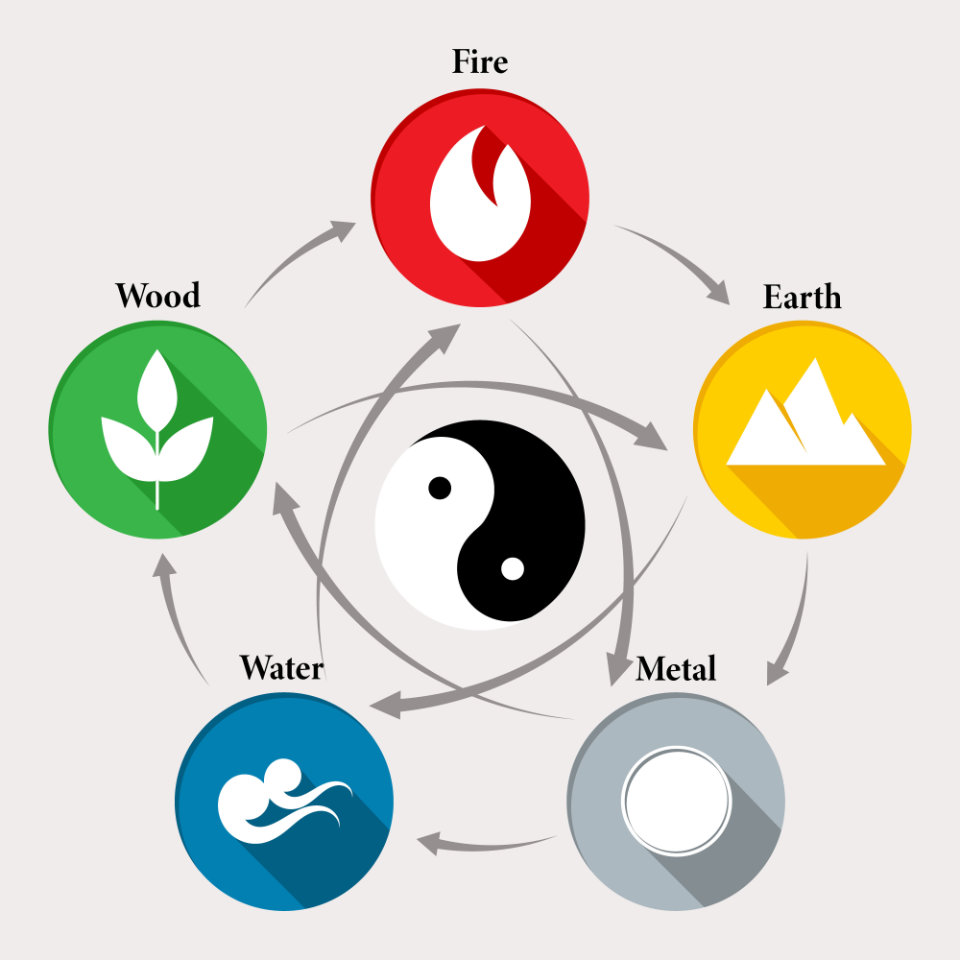The Chinese 5 Elements – Wood, Fire, Earth, Metal, and Water – are fundamental to Chinese philosophy, interwoven into its astrology, medicine, and Feng Shui.
These elements are not just physical substances but symbolic representations of different energies and qualities that shape natural phenomena and influence our lives.
Understanding the Chinese 5 Elements helps us comprehend the balance and cycles in our environment and personal experiences.
Table of Contents
Detailed Overview of Each Element
1. Wood
- Characteristics: Symbolizing growth and vitality, Wood represents new beginnings, expansion, and flexibility.
- Influence: In human behavior, Wood is associated with creativity, compassion, and adaptability. People with a Wood element in their chart tend to be sociable, imaginative, and empathetic.
2. Fire
- Traits: Fire signifies energy, transformation, and passion. It’s about dynamism and change.
- Impact: This element influences people to be enthusiastic, expressive, and bold. Fire brings warmth but can also lead to impulsive decisions if not balanced.
3. Earth
- Qualities: Representing stability and nourishment, Earth is about grounding and practicality.
- Role: It affects our lives by encouraging patience, reliability, and thoughtfulness. An Earth-heavy personality tends towards pragmatism and nurturing attitudes.
4. Metal
- Attributes: Symbolizing strength and determination, Metal is associated with structure and discipline.
- Influence: It endows a sense of order and focus. People influenced by Metal are often organized, ambitious, and resilient.
5. Water
- Characteristics: Water, fluid and ever-changing, represents wisdom, healing, and introspection.
- Effects: It influences individuals to be introspective, intuitive, and emotionally aware. Water types are often adaptable but can be overly sensitive.
The Chinese 5 Elements in Astrology
In the realm of Chinese astrology, the 5 Elements – Wood, Fire, Earth, Metal, and Water – play a pivotal role in defining and influencing the characteristics associated with each zodiac sign.
Unlike Western astrology, where elements are tied to specific signs, Chinese astrology applies these elements dynamically, with each year, month, day, and even hour being governed by a particular element.
This creates a rich and complex array of influences that can be interpreted to gain deeper insights into personality, compatibility, and destiny.
1. Elemental Years and Zodiac Signs:
- Each year in the Chinese calendar is associated with one of the 12 zodiac animals and one of the 5 Elements. This combination, which repeats every 60 years, offers a detailed character and destiny analysis. For instance, a Wood Rat year brings different qualities than a Water Rat year, with Wood emphasizing growth and renewal, while Water might highlight adaptability and introspection.
2. The Five Elements and Personal Attributes:
- Each element bestows specific traits and tendencies on individuals born in its year. People born in a Fire year, for instance, are often seen as more dynamic and passionate, while those born in an Earth year might be more grounded and stable. Understanding the governing element of your birth year can offer profound insights into your innate nature and life path.
3. Elemental Interactions:
- The interplay between different elements can significantly impact personal relationships and life events. For example, Water might naturally support Wood (as water nourishes plants), suggesting harmonious relationships between individuals governed by these elements. Conversely, the relationship between Wood and Metal might be more challenging, as Metal can symbolically chop Wood, indicating potential conflicts or growth areas.
4. Forecasting and Predictions:
- Astrologers use the Chinese 5 Elements to make predictions about future trends, both on a global scale and on an individual level. By understanding the prevailing element of a particular year or period, one can anticipate the types of challenges or opportunities that might arise.
5. The Element of the Current Year:
- In the context of predictions and personal horoscopes, the element of the current year plays a crucial role. For example, in a Metal year, individuals might find it beneficial to focus on structure, organization, and long-term planning. Similarly, a Water year might call for flexibility, emotional intelligence, and introspection.
By integrating the principles of the Chinese 5 Elements into astrological practice, practitioners and enthusiasts alike can access a deeper level of understanding about the natural world and human behavior.
These elements offer a unique lens through which to view our interactions, challenges, and opportunities, providing a rich and dynamic system of interpretation and guidance.
The Chinese 5 Elements in Feng Shui
In Feng Shui, an ancient Chinese art of creating harmonious surroundings, the Chinese 5 Elements play a crucial role. These elements – Wood, Fire, Earth, Metal, and Water – are essential tools in applying Feng Shui principles to balance and enhance the energy (Chi) in living and working spaces.
Understanding and appropriately applying these elements is key to achieving a sense of well-being and prosperity.
1. Feng Shui Period 9 and the Elements:
- As we approach Feng Shui Period 9 (2024-2043), the Fire element becomes increasingly significant. This period emphasizes light, energy, and visibility, which align with the qualities of Fire. Incorporating this element into your environment can be particularly auspicious during this time, fostering growth, inspiration, and positive transformation.
2. Balancing the Elements:
- The core of Feng Shui practice is creating a balanced and harmonious environment. This involves ensuring that none of the 5 Elements overpower the others. For instance, an excess of the Water element might create a sense of imbalance, leading to lethargy or emotional overwhelm. Balancing Water with elements like Earth or Wood can restore equilibrium.
3. Feng Shui Amulets and Elements:
- Feng Shui amulets often incorporate symbols or materials representing the 5 Elements. For example, a metal amulet could be used to enhance the Metal element in a space, bringing qualities of clarity and precision. Understanding the properties of each element helps in choosing the right amulet to harmonize or enhance specific energies.
4. Applying Feng Shui Principles with Elements:
- Effective use of the 5 Elements in Feng Shui involves understanding the unique properties and interactions of these elements. Each element can be represented by specific colors, shapes, and materials. For example, Wood can be incorporated through green hues and plants, while Metal might be represented by white or metallic objects and rounded shapes.
5. Avoiding Feng Shui Mistakes:
- A common mistake in Feng Shui is the overuse or misplacement of certain elements. Overemphasizing the Fire element, for instance, could lead to agitation or conflict, especially if not balanced with calming elements like Water or Earth. Knowing the characteristics and effects of each element helps avoid such imbalances.
6. Personalizing Element Use:
- The choice of elements in Feng Shui can also be personalized according to individual needs and the specific areas of life one wishes to enhance. For example, incorporating more of the Wood element might be beneficial for growth in career or personal development, while adding Earth elements can support stability and nourishment in relationships.
Incorporating the Chinese 5 Elements into Feng Shui practice provides a nuanced and effective approach to creating environments that not only look aesthetically pleasing but also resonate with positive, balanced energies.
Interactions and Cycles of the Chinese 5 Elements
The interplay between the Chinese 5 Elements – Wood, Fire, Earth, Metal, and Water – is fundamental to understanding both the natural world and our personal experiences.

These elements interact through two primary cycles: the Creative (Generating) Cycle and the Destructive (Controlling) Cycle.
1. The Creative (Generating) Cycle:
- In this cycle, each element serves as a source of energy for another, promoting growth and development. The sequence is as follows: Wood fuels Fire; Fire creates Earth (through ash); Earth bears Metal; Metal enriches Water (as minerals); and Water nourishes Wood. This cycle exemplifies support and nurturing, where each element helps to strengthen and generate the next.
2. The Destructive (Controlling) Cycle:
- Conversely, in the Destructive Cycle, each element can suppress or weaken another. The cycle works like this: Wood depletes Earth (as roots draw nutrients); Earth absorbs Water; Water quenches Fire; Fire melts Metal; and Metal chops Wood. This cycle is about balance and restraint, ensuring no element becomes overpowering.
Understanding these cycles is crucial in various Chinese practices, from Feng Shui to medicine, as it helps in creating harmony and balance. For instance, if someone’s personal element is overwhelmingly strong, introducing elements from the controlling cycle can bring equilibrium.
Traditional Chinese Medicine (TCM) and the Elements
In TCM, the Chinese 5 Elements theory is a cornerstone for diagnosing and treating illnesses. Each element is associated with different organs, emotions, and aspects of the body, providing a holistic approach to health.
1. Element-Organ Relationships:
- Wood: Linked to the liver and gallbladder. It governs the smooth flow of Qi and blood in the body.
- Fire: Associated with the heart and small intestine. It relates to mental clarity and consciousness.
- Earth: Connected to the spleen and stomach, representing digestion and nutrient absorption.
- Metal: Corresponds to the lungs and large intestine, involved in respiration and elimination.
- Water: Related to the kidneys and bladder, governing fluid balance and the body’s cleansing processes.
2. Diagnosing Imbalances:
- Practitioners of TCM assess imbalances in these elements as part of the diagnostic process. For example, a deficiency in the Wood element might manifest as indecisiveness or digestive issues, while an excess might lead to anger or liver problems.
3. Treatment Approaches:
- Treatments in TCM aim to balance the elements within the body. This can include herbal remedies, acupuncture, dietary adjustments, and Qi Gong exercises, each tailored to address specific elemental imbalances.
4. Emotional and Psychological Well-being:
- TCM also considers the emotional aspects associated with each element. For instance, fear is linked to Water (kidneys), and worry to Earth (spleen). Addressing these emotional imbalances is seen as integral to overall health.
The integration of the Chinese 5 Elements in TCM offers a unique perspective on health, emphasizing the interconnectedness of physical, emotional, and environmental factors.
By understanding and applying these principles, TCM practitioners aim to achieve a harmonious balance within the body, essential for holistic well-being.
Modern Applications and Perspectives
The Chinese 5 Elements, an ancient framework, continue to influence modern wellness, environmental sustainability, business leadership, and design.
These elements provide insights for balanced lifestyles, guiding choices in diet, stress management, and personal growth. In environmental efforts, they underscore the interconnectedness of ecosystems, promoting sustainable practices.
In business, understanding these elemental attributes aids in team dynamics and strategic planning, fostering productive, harmonious work environments. In design, the principles guide the creation of balanced, aesthetically pleasing, and energetically harmonious spaces.
As a tool for personal development, the Chinese 5 Elements encourage self-awareness and holistic growth, deepening our connection to the world and ourselves. These timeless principles remain relevant, offering guidance for a harmonious modern life.
Applying the Chinese 5 Elements Theory Effectively
The Chinese 5 Elements theory is more than an ancient philosophy; it’s a living guide to understanding the world and ourselves.
By exploring these elements, we gain insights into the interconnectedness of nature and human existence, opening doors to greater harmony and understanding.



